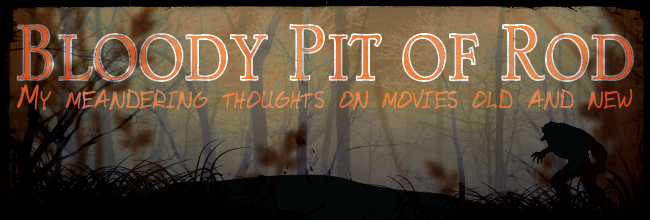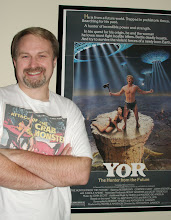A young man is driving in the French countryside at night
when he spots a beautiful woman (Brigitte Lahaie), dressed only in a nightgown,
standing in the road. She tells the driver her name is Elisabeth but seems
confused and frightened. She insists someone is pursuing her but can't say
whom. She begs the fellow to take her with him, so he places her in his car and
somehow misses seeing a nude redheaded woman just off the road calling out to
Elisabeth for help. He carries the girl to his flat in Paris and after questioning her learns that
she seems incapable of retaining memories for any length of time. He tells her
his name is Robert but she even has trouble remembering that only a few minutes
later. She asks him to please not leave her alone because she knows she'll
forget him as soon as he isn't there to remind her of what she has experienced.
Magnetically drawn to each other, the pair makes love in a tender scene, during
which Robert tells Elisabeth to watch his face so she'll always remember this
time together. But the next morning after Robert goes to work, Dr. Francis
breaks into the flat and convinces Elisabeth to return with him to his
high-rise clinic where he is treating dozens of people with her memory
deficiency. Once in the clinic she finds the redheaded girl from the night
before and learns that they can remember each other's names but little else
about their relationship. The two friends attempt another escape and manage to
contact Robert but are quickly recaptured. A frantic and lovesick Robert
locates the clinic and is told by Dr. Francis that his patients are suffering
from a disease that slowly robs them of all their mental functions. The doctor
has been trying to treat them but has had no success. He explains that,
ultimately, all the afflicted become like the walking dead with no cognitive
abilities. But Robert refuses to believe him and is determined to rescue his
beloved.
The films of Jean Rollin are unusual in ways that many find
off-putting. They usually meander around colorfully surreal or absurd images
and morbid situations for long stretches so that it becomes unclear where the
(sometimes thin) narrative is going. They always have a dreamlike tone that can
drive some viewers mad with the desire to hit the fast forward (or stop) button.
But for those who share Rollin's sensibilities, these films are gorgeous and
evocative pieces that seem lifted out of a fascinating other world. The stories
are a mixture of quaint old pulp conventions and wild sexual excitement that,
at its best, blends into something no one else in cinema really tries. There
are points of similarity between Rollin and Jess Franco, but where Franco seems
more interested in pumping out as many films as possible, I feel Rollin has a
stronger body of work. Rollin always seems to have a central idea around which
he's gathering images in the same way a poet will collage words. He layers
quiet, moody shots of beautiful, melancholy women walking through gorgeous
locations with horrific images of bloody violence in what seems to be an effort
to get beyond the shock of the juxtaposition and question the feelings that are
provoked. Since the violence is often linked with sexuality there is a
reoccurring idea in his films that sex is both the beginning and ending of
life. Indeed, in The Night of the Hunted sex is the only thing the
poor afflicted souls can experience and remember.
This isn't the sex-equals-death concept of so many American
slasher films but a more European view of sex as a transformative and healing
act even when it's linked with danger. Rollin's parade of undead creatures are
almost always beautiful but tortured. Unhappy in life they are just as
unfulfilled in death —but are now robbed of the choices life afforded. Joy
is always in the past for Rollin's characters and tears are their only
response. In Night of the Hunted the diseased people aren't zombies
or vampires but are rendered "dead" all the same. Their tragedy is
made all the more touching by its gradual, degenerative nature putting me in
mind of the victims of Alzheimer's or Parkinson's.
The Night of the Hunted (La Nuit Des
Traquées) is often cited as one of Rollin's weakest films but I don't feel
that way. It's famous for its small budget and two-week shooting schedule, but
even though its extremely low budget is occasionally evident I think the
director stages his story well enough to hide most of its financial
shortcomings. The performances are not exceptional by any means but get the job
done effectively and the frequent nudity is a plus that distracts me from a few
of the more wooden actors. In all honesty, the film could be much worse than it
is and I would still champion it simply because of its inspired final shot. The
image of two defeated and desolate characters walking away from the camera into
the distance becomes the antithesis of riding off into the sunset. It's a
haunting and deeply effecting image that stays with me for weeks after every
viewing. As cheaply produced as this film is, I enjoy it a great deal more than
some of Rollin's more expensive works, with The Demoniacs being my perfect
example of more being much less. I wouldn't start a newcomer to Rollin's movies
here since it lacks his usual vampires and phantasms, but it might be a good
second feature to try.












2 comments:
Saw it once, wasn't my cup of tea.
Believe it or not, this was my first Rollin feature, and I was so impressed that I sought out his other works. This is a subtle film, but very worthwhile.
Post a Comment